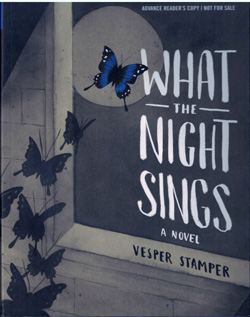What The Night Sings by Vesper Stamper; Borzoi Book of Alfred E. Knopf; © 2018; isbn pending: 18.99; 250 pages plus notes and glossary.
By Donald H. Harrison

 SAN DIEGO – This novel is a welcome addition to Holocaust literature. It plumbs the emotions of young Holocaust survivors in the Displaced Persons (DP) camps as they try to recover from brutalization and near starvation.
SAN DIEGO – This novel is a welcome addition to Holocaust literature. It plumbs the emotions of young Holocaust survivors in the Displaced Persons (DP) camps as they try to recover from brutalization and near starvation.
In particular, the novel, written for teenagers, focuses on Gerta, whose Jewish parents raised her to think that she was Christian, until she—and they—were discovered by the Nazis, and processed through the Hitlerian routine of ghettoization, internment, and, in the case of most of Gerta’s family, death.
But rather than linger on the brutality of the Holocaust, so well told by others, author Vesper Stamper chose to focus on the process of post-war recovery as experienced by teenagers Gerta, Lev, and Michah.
There is a love triangle in this novel. Gerta is infatuated with Michah, an energetic Zionist whose passion is getting everyone ready to immigrate illegally to British Mandate Palestine. At the same time, Lev, a soft-spoken Orthodox Jew, has feelings for Gerta. They all are really young, but with no other surviving members of their families in Europe, they feel an imperative to reach out to each other and perhaps to start families of their own.
One of the many interesting aspects of this fine novel is that it explores the psychological impacts that sustained hunger, dehumanization, the constant fear of and exposure to death, and inhumane living conditions had on Survivors.
A sub-theme of the book is the restorative power of music. Although Gerta is a singer, she cannot find her voice in the concentration camps. But she is able to play her murdered father’s viola well enough to be chosen for the camp orchestra – a talent that may have kept her alive.
While Gerta never knew what it was like to be Jewish, much less a religious Jew, Lev’s life had just the opposite trajectory. Raised in Orthodox Judaism, he faced secular situations in both the concentration camps and the Displaced Persons camps for which he was unprepared. Could he keep his balance?
The book is easy to read and includes drawings by the author which enhance her narrative.
*
Harrison is editor of San Diego Jewish World. He may be contacted via donald.harrison@sdjewishworld.com